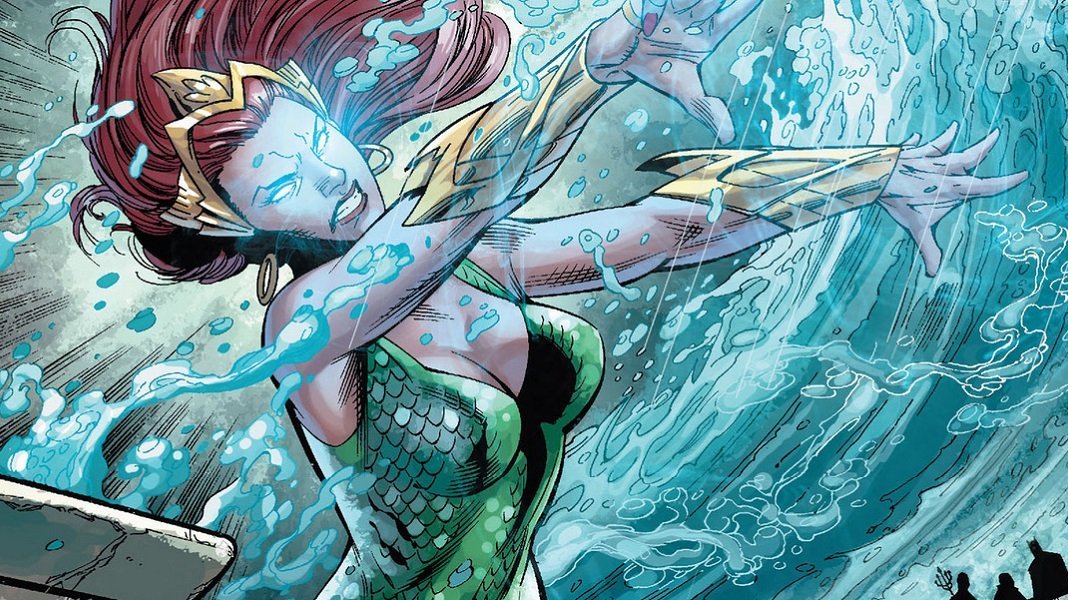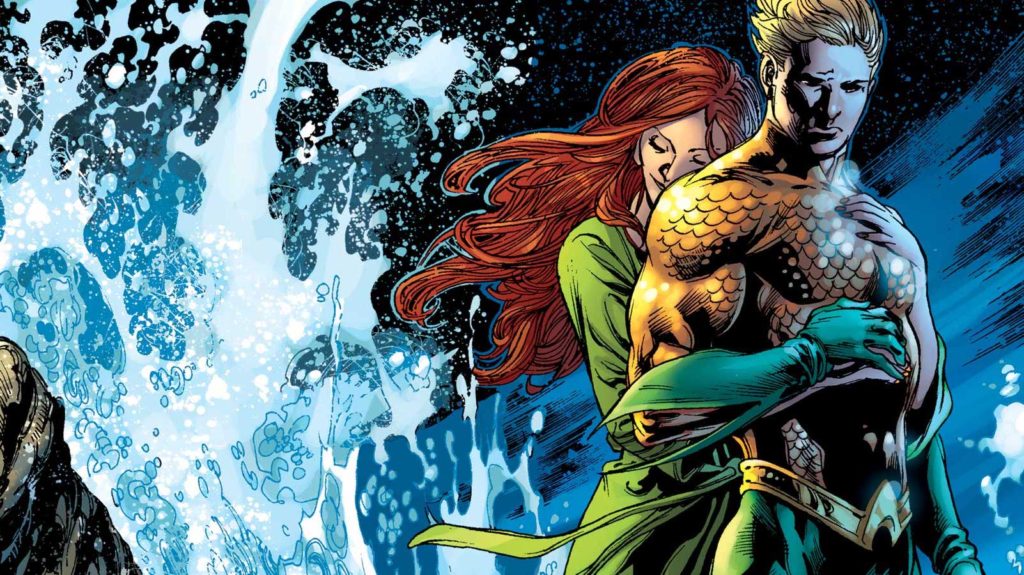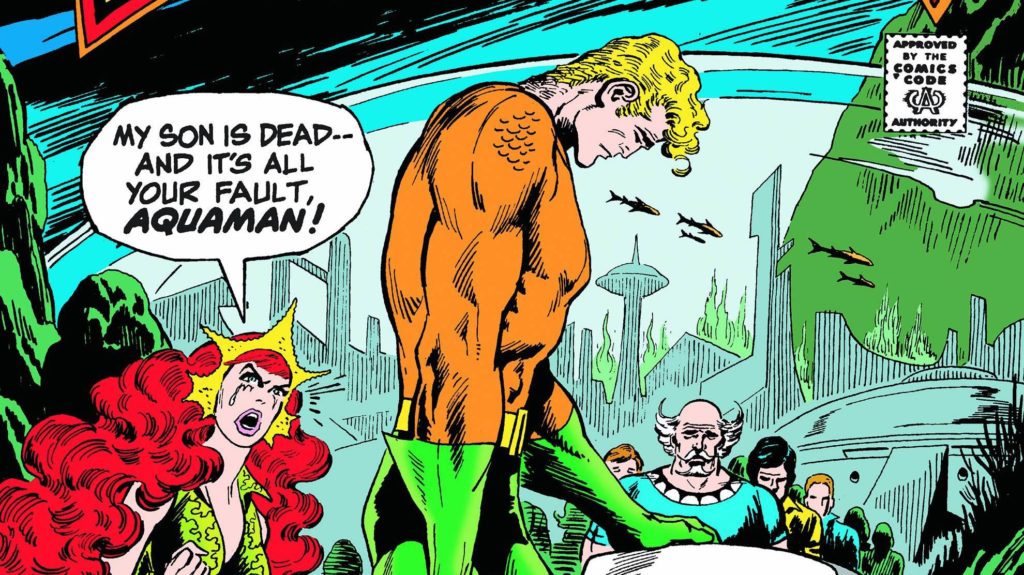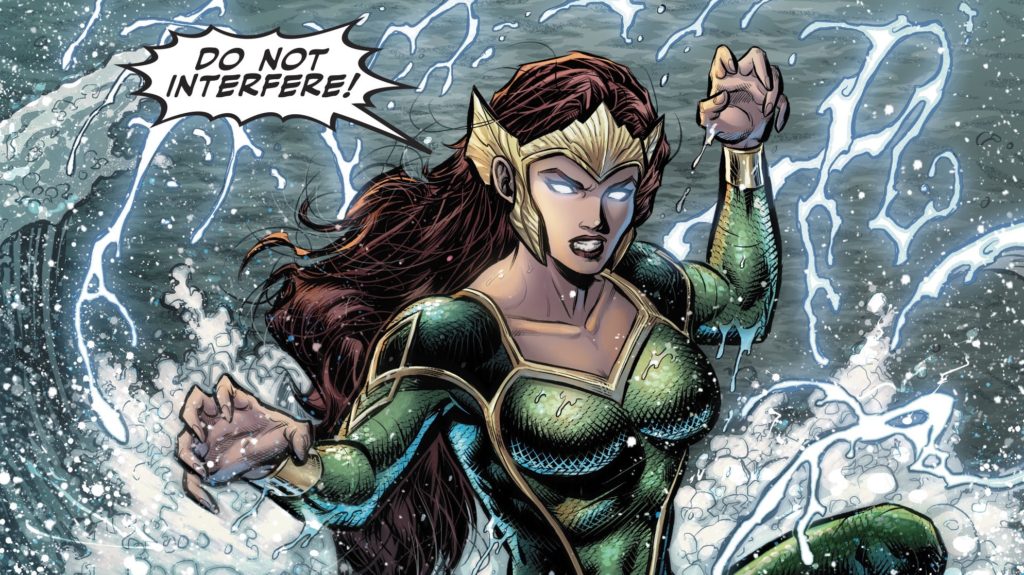The Not So Secret History of Mera and How She Became An A-Lister

Join the community on Reddit for the latest Marvel & DC news!
No matter what happens with the Aquaman movie franchise, one thing is undeniable … the history of Mera is both bizarre and strange. That being said, through it all she has cemented herself as one of DC’s best female superheroes…and here’s how she did it.
Mera is one of the most influential women in DC Comics. Alongside Aquaman, she has patrolled the Seven Seas, protected Atlantis, and helped bridge the gap between those living on land and those living in the sea. Mera is the Queen of Atlantis and not only one of the fiercest women under the water, but arguably the fiercest on land too. She’s powerful beyond imagination, is able to do things that most can only dream of, and commands the attention and respect of all those around her.
Put it this way. Mera is so respected (and loved) that Batman, the most straight-faced and black and white character in comics, asked her to join the Justice League. The Justice League. Superman. Wonder Woman. Green Lantern. The Flash. And every other prominent character DC has to offer.
No matter what’s thought of the history of Mera, she is Aquaman’s equal. Not his underling, sidekick, or stay at home wife.
His equal.
Think Dick Grayson or Bucky Barnes. Both were once sidekicks to their publisher
Mera’s popularity has soared over recent years. Aside from starring in multiple books, she has also been translated to the Big Screen, and made little girls (and boys, this one included) fall in love with her.
Her rise to stardom, however, wasn’t as simple as walking a straight and wide path. Instead, it was filled with twists, turns, poor writing, terrible character development, and an era that never truly realized her potential.
But before we dig into that…
The history of Mera began as the
As mentioned, Mera is from the fictional underwater colony of Xebel and Xebel was once a member of the Atlantean empire. However, after a series of conflicts, Xebel was cast out of Atlantis and sent into another dimension (originally only accessible through the Bermuda Triangle). The idea was to punish Xebel for the conflicts by both sending them into another dimension and turning them into a penal colony. If you’ve read anything about early Xebel, you might have seen it referenced as Dimension Aqua. Know that they are one and the same. Eventually, after multiple forms of contact with Atlantis, Dimension Aqua was given the name Xebel back.
What’s important for you to know is that Xebel faults Atlantis for their tough history. Because of this, Xebel and its people are in constant war with Atlantis. But it isn’t just war they seek. No, not at all. More than war, they wish to kill and overthrow the Atlantean King. Because Mera is from Xebel she has the unusual ability to slip through the dimensional barrier that keeps her and her people separated from the rest of the world.
Wanting their freedom, Xebel and its King devise a plot to send Mera through the Dimensional Barrier. Once on the other side, Mera is to kill the King.

As a side note, what makes the eventual relationship between Mera and Aquaman work (when it works) is that each understands what each goes through. Aquaman is the bridge between the human world and the Atlantean world…two worlds that struggle to find peace. Mera, on the other hand, is the bridge between Xebel and Atlantis…two other worlds that struggle to find peace.
Anyway, it’s important to note that before leaving Xebel, Mera was given a message from her mother…a message that at this time she chooses not to listen to.
Once on the other side of the barrier, she is greeted by a group of sailors. They tell her stories of a good and fair King; a King who helps those in trouble at sea. Learning this comes as a surprise to Mera. Remember, she hails from Xebel and the stories told in Xebel paint him as a horrible King.
When she finally finds Aquaman, she sees that the stories she heard were actually true. Even more confusing was that after seeing her, Aquaman approached her without the intention of violence but rather, to ask her to dinner.
At dinner
Although long overdue, this story doesn’t do too much to correct the terrible history of Mera or her neglect over the years.
Remember, Mera was created in a day and age that saw male superheroes, not female superheroes, as the ones who saved the world. Like Lois Lane to Superman or Mary Jane to Spider-Man, Mera was the love interest of Aquaman. While he spent his time battling evil under the sea and above it, Mera was often relegated to being a housewife. Yes, I said it. Mera, arguably the most powerful being in the Seven Seas, was treated as nothing more than a housewife. Never was this more apparent than after the birth of Arthur Curry Jr., Aquababy.
Yes, Aquababy.
Right or wrong, Aquababy was her life. She answered his cries and cradled him to sleep. She changed him, fed him, and entertained him. Basically, she personified everything that the 1960s said a woman should be.
By no means do I agree with how DC gave Aquaman a boost in popularity but in one of their most infamous stories, Death of a Prince, they did. Death of a Prince is infamous for many things. First, it helped to jumpstart the Aquaman character in a time when nobody cared for him. Second, it showed exactly how far a publisher would go to sell some books. And third…
For anyone who doesn’t know, Death of a Prince carried out the murder of Aquababy.
The story follows the couple as they lose their child and the fallout they experienced because of it. I should say that if Aquababy had died from natural causes, I don’t think that anybody would’ve been too upset about it. After all, though heart
Let me paint a picture for you.
In one of the most gruesome panels in comics, Black Manta kidnaps Aquababy, puts him in a sphere and begins to fill the sphere with air. Aquababy, who is unable to breathe outside of water, swallows the air, thereby suffocating himself. But the horror of the situation isn’t only that. To save his newborn son, Black Manta forces Aquaman and Aqualad to fight one another…and event that would forever change their relationship.

Death of a Prince was that generations Killing Joke. It set the comic world ablaze all-the-while raising the stakes of what was acceptable. But it wasn’t only that. The story did multiple things for each character involved. First, it changed the family dynamic between Aquaman and Aqualad. Second, those involved were forced to grow in unexpected ways. And third, after it, the history of Mera and Aquaman could never be the same.
If done properly, Death of a Prince should’ve
This treatment of Mera would’ve probably looked better had the same been done to Aquaman.
But it wasn’t.
Unlike Mera, who became a worse character, Aquaman became a better and more interesting character. Worse yet, both Mera and Aquababy suffered the same fate as countless other female characters…a trope used for the benefit of male development.
Just read this.
For a time, she found herself in Hell, reconciled her relationship with Aquaman only to have her instability cause it to once again fail, lost her mind and spent time in rehab, nearly died, had a son with Aquaman’s doppelgänger, and more. While this was happening, Aquaman was out saving the world.
To say that the history Mera at this point in time and her development was a mess is the understatement of the millennia. I’d go as far as to say that Mera was disrespected. This is especially true when you consider that many, myself included, believe her to be more powerful than Aquaman.
I’m going to circle back to this but before I do…
Mera really began coming into her own during the Green Lantern epic, Blackest Night. I won’t dive too deep into Blackest Night in this article, so, if after I’m done and what I’ve said has p
Blackest Night saw Black Hand raise the dead/turn those who were once dead but now alive into Black Lanterns. The story follows the unaffected heroes as they try to stop Black Hand from bringing Nekron (the embodiment of death) into the world.
Spoiler alert…they succeed.
Blackest Night is a landmark DC story for a few reasons. First, it introduced the Black Lanterns. Second, it introduced many other Lantern Groups. For example the Red Lanterns, the Orange Lanterns, and my personal favorite, the Blue Lanterns. And third, it gave Mera a chance to become more than merely Aquaman’s wife.
It did this by turning her into a Lantern…but not just any Lantern, a Red Lantern. For context, the Red Lanterns represent Rage on the Emotional Spectrum. This means that whether they outwardly project it or not, they are often filled with insatiable anger. If selected to become a Red Lantern, the wearer of the ring typically acts without remorse for their actions. Basically, they are blinded by their anger.
When DC turned Mera into a Red Lantern, they had an opportunity to do something with the character that just hadn’t been done before…undo the history of Mera as only a woman who stands behind Aquaman.
So they did.
As is almost always the case with powerful comic book sequences, in a few short panels Mera unleashes her anger. But she didn’t start with action. No, not at all. She did it with words:
Aquaman: “I loved our son too. I loved him so…”
Mera: “I never wanted children.”
While I don’t believe what she said to be true, the words are truly powerful. Here is Mera, wife to Aquaman, in a way telling him that she didn’t want to be strapped down by children. Telling him that she didn’t want a life where she supported the family. And telling him that she wanted to be more than she was.
If that didn’t drive the point home, right after her explosion she expelled a burst of flames towards Aquababy and Aquaman. This short moment was a seminal moment in the history of Mera. Moving forward, it would be one that defined her.

Blackest Night showed Mera for what she was…powerful. So powerful, in fact, that many, myself included, began questioning whether or not she was more powerful than Aquaman.
All of this leads me to a simple question…one that you may be able to help me with. Why? Why did DC take so long to capitalize on a character with as much potential as Mera?
I don’t have a real answer for this but I do have a couple of theories.
First, the history of Mera began at a time when women superheroes, save for Wonder Woman, weren’t as accepted as their male counterparts. They weren’t supposed to be powerful. They weren’t supposed to be important players in the world of comics. And they weren’t supposed to be looked at in the same light as the males. Instead, they were meant to assist, support, and/or be there when their husbands, boyfriends, and love interests return.
This isn’t to say that important female characters didn’t exist in comics…just look at Catwoman (although she disappeared for a
Mera is a perfect example of this. Even though she is arguably the second most important character in Atlantis, she was only ever that…the second most important character in Atlantis. She was Mera, Queen of Atlantis, wife of Aquaman, mother of Aquababy, and descendant of Xebel. Nothing more and nothing less.
Second and perhaps I’m merely speculating, Mera just wasn’t important in the eyes of DC. The stories she was apart of, the character twist and turns she went through and her placement atop DC’s mountain just wasn’t as important as the already mentioned Wonder Woman.
Think about it.
Mera was/is the wife of the laughing stock of DC. Since his creation, Aquaman has spent his life at the butt-end of more jokes than a comedy tour.
Right?
He talks to fish, can be killed by a set of 6 pack rings, and he can’t fly so he flies Southwest. Aquaman has been wrongfully cast as DC’s most useless superhero and as a consequence, Mera has been cast as DC’s most useless superheroine.
The problem with this theory
So, then what is it? What is the reason it took so long for Mera to climb to the top of the DC mountain?
Simple.
The world wasn’t ready for her.
Comic book publishers have made it a priority over the past couple of decades to push female characters into the spotlight…and rightfully so. DC has done with Catwoman, Poison Ivy, Batgirl, Harley Quinn (which by the way I’ve
Comic book companies have realized and now see the value of diversification. Male superheroes cater to only a small segment of the market and that segment isn’t quite as big as the rest of the market. If that’s not convincing you, remember this…comic companies are out to make money and making money means catering to everybody.
And if that still doesn’t convince you … If comic books and their characters plan to be around for another 75 years, the companies that run them need to embrace the entire market.
And so they do.
The proof is in the history of Mera. Mera has climbed from, pardon the pun, the deepest depths of the ocean to the highest point of a mountain. She is and continues to be everything that modern comics and their characters stand for. She’s powerful in both her abilities and the respect she commands. She’s able to not only stand up to anyone but more often than not, defeat them in battle…Orm knows this all too well. Best of all, she’s become the definition of what a modern age superhero is.
Mera is beautiful, smart, strong, a leader, unafraid to speak up, values the opinion of those around her, and every other trait that’s held in high regard around the globe. She, like so many others, has changed the perception of what female superheroes are. She proves that female superheroes aren’t just overtly sexualized eye-candy for their readers. Instead, female superheroes are superheroes that give the world hope for the future. Female superheroes are superheroes that make their readers better. And female superheroes are not the silent partner to their male counterparts.
As I always do with these in
So, may they be around forever.
Cheers,
Joel
Liked this article? Join the community on Reddit for the latest Marvel & DC news!

